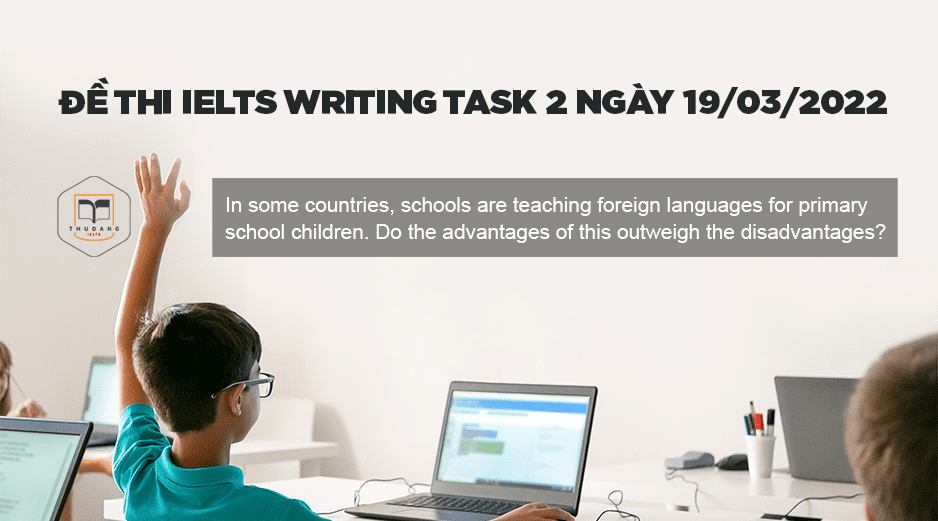IELTS THƯ ĐẶNG- TRUNG TÂM LUYỆN THI IELTS UY TÍN, CHẤT LƯỢNG TẠI HÀ NỘI
Tham khảo các bài liên quan:
>>> Kinh nghiệm luyện thi IELTS
>>> Hướng dẫn làm bài thi IELTS
ĐỀ THI IELTS WRITING TASK 2 NGÀY 19/03/2022
Đề thi IELTS Writing Task 2 ngày 19/03/2022 vừa qua thuộc dạng câu hỏi Advantages – Disadvantages. Để ghi điểm cao ở dạng đề này thí sinh cần biết cách triển khai và lên ý tưởng trả lời câu hỏi về việc giảng dạy ngoại ngữ cho trẻ ngay từ tiểu học có phải sẽ nhiều lợi thế hơn bất lợi không.
Cùng IELTS Thư Đặng phân tích dạng bài mẫu đề thi IELTS Writing Task 2 ở bài viết dưới đây để ghi lại một số từ vựng quan trọng ở dạng bài này nhé!

Đề thi IELTS writing task 2 ngày 19/03/2022
In some countries, schools are teaching foreign languages for primary school children. Do the advantages of this outweigh the disadvantages? |
HƯỚNG DẪN LÀM BÀI:
Dàn bài
Introduction:
Paraphrase đề bài.
Trả lời câu hỏi: lợi ích của việc dạy ngoại ngữ ở cấp tiểu học nhiều hơn bất lợi
Body paragraph 1:
- Lợi ích của việc dạy trẻ em ngoại ngữ
- Lợi ích 1: Trẻ em dễ tiếp thu hơn so với thanh thiếu niên
- Lợi ích 2: Duy trì được sự hứng thú và tiến độ học tập vì thời khóa biểu linh động
Body paragraph 2:
- Bất lợi của việc dạy ngôn ngữ khi trẻ em còn quá nhỏ
- Bất lợi 1: Đa số các giáo viên tiểu học dạy nhiều môn chứ không chuyên về ngoại ngữ
- Bất lợi 2: Sự chênh lệch về khả năng khi ứng tuyển vào cấp 2 có thể khiến học sinh mất hứng thú khi học ngôn ngữ
Conclusion:
- Việc học ngoại ngữ mang lại nhiều lợi ích cho cá nhân và cả xã hội. Các bất lợi nêu ở trên có thể giải quyết nếu thực thi các chính sách rõ ràng.
Sample Answer These days, the paramount importance of knowing a foreign language is universally acknowledged, and an increasing number of primary schools have made language teaching an essential part of their curriculum. This has both positive and negative outcomes, and I believe that the demerits are far outweighed by many great merits it brings. It is undeniable that teaching young children languages is beneficial for several reasons. Young minds are proven to pick up languages much more easily compared to adolescents as their brains are still programmed to acquire their mother tongue. This has the added benefit that children might gain a better understanding of other cultures at an early age, thus facilitating their personal development in later life. Primary schools’ timetables also allow shorter sessions with a play-centered approach, which helps maintain learners’ enthusiasm and progress. In many non-native English-speaking countries, for instance, teenagers tend to feel demotivated and overwhelmed when studying this global language due to their hectic schedule and a huge amount of work needed to complete everyday. Nonetheless, learning foreign languages at such a young age is associated with drawbacks. The majority of primary teachers are generalists, so they might not have the required knowledge and qualifications themselves. If specialists need to be brought in to deliver these lessons, the flexibility of primary schools’ timetables no longer exists. Let us not forget either that the various levels of ability among young students can be a major disadvantage for secondary schools when it comes to classifying them in different classes. If some are taught what they already know while their peers have zero knowledge of the language, they are highly likely to lose interest sooner or later. In conclusion, early exposure to language learning benefits individuals and society as a whole. As long as clear policies are adopted, the problems mentioned above could be addressed efficiently and strategically.
|
Một số từ vựng cần highlight
- paramount importance (noun phrase): sự quan trọng bậc nhất
- acknowledge (v): công nhận, thừa nhận
- curriculum (n): chương trình học
- demerit (n): bất lợi
- merit (n): lợi ích
- pick up languages (phrase): học ngôn ngữ
- mother tongue (noun): tiếng mẹ đẻ
- gain a better understanding of (phrase): có hiểu biết tốt hơn về cái gì
- personal development (noun phrase): sự phát triển cá nhân
- play-centered approach (noun phrase): phương pháp dạy tập trung vào các hoạt động vui chơi
- enthusiasm (n): sự hứng thú
- demotivated (adj): mất động lực
- overwhelmed (adj): choáng ngợp
- hectic schedule (noun phrase): thời khoá biểu bận rộn
- have zero knowledge of (phrase): không có kiến thức về cái gì
- flexibility (n): sự linh động
- strategically (adv): một cách chiến lược
IELTS - Thư Đặng Tổng hợp!
Ngoài ra các bạn có thể tham khảo thêm rất nhiều nguồn tài liệu khác ở các thư mục của Website:




.png)

.png)